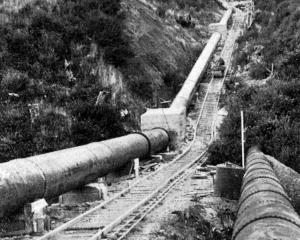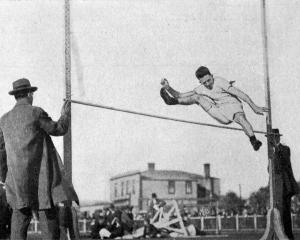The speaker, a man over 60 years, with the frame of a giant, said that the work in which he was engaged was exceedingly strenuous, and at times hazardous. The extension of the telegraph lines in broken country was by no means child's play. The cutting of tracks through the primeval forest was bad enough, but when the heavy coils of wire and poles had to be hauled up steep hillsides and across unbridged streams, a linesman's job was difficult and sometimes dangerous.
In some cases it was quite impossible to transport the sawn poles provided by the department, and the men were obliged to fell the local timber and shape it themselves. In some localities water was not procurable within easy reach of the camps, and had to be carried for miles to the men's temporary habitation. As everyone knows, the telegraph lines in exposed situations more frequently break down in winter than in summer. Repairs have to be promptly carried out.
''Our life is a hard one,'' said the speaker, ''but there is plenty of variety about it, and I don't think anyone can say that is has done me any harm. The pay, though, might be better. Nine shillings a day for what we have to go through is not much when you have a wife and family to maintain.''
• Mr A Considine has been saying some strong things against prohibition. As a justice of the peace, he told a representative of the South Australian Register he had had ample opportunities of watching the movement, and considered it was far from being a success. In the prohibited districts people were constantly being brought before the court for sly grog-selling, and some of them were fined as much as 100. Still the evil continued. Prohibition was having the effect of producing a very inferior class of houses of accommodation for the travelling public. Business had also fallen off considerably in towns which had adopted prohibition, as travellers preferred to go to other places miles off where their comforts might be attended to.
People living in a prohibition town would drive a few miles to secure their supplies of liquor and take it home in bulk. Then again, the police had free access to licensed houses at all times of the day and night, but they had to have substantial evidence before they could enter a private house suspected of conducting a sly grog traffic. Under the present system the drink evil was not reduced, and the morality of the towns suffered.
• A custom among the Maoris of the old school was to hide away their money in cabbage trees and such like receptacles, where it was hoped it would be safe from the younger and more extravagant members of the tribe. Evidence of the fact that the custom still exists was secured by the manager of a Waverley bank the other day, when a young Native walked in and deposited a number of notes and a quantity of silver.
The notes were issued in 1890 and were as crisp and clean as the day they were issued, indicating clearly that they had been withheld from further circulation by the Native originally acquiring them. The bank manager ascertained from the depositor that the money has actually been hidden away for years. - ODT, 23.1.1913.
• COPIES OF PICTURE AVAILABLE FROM ODT FRONT OFFICE, LOWER STUART ST, OR WWW.OTAGOIMAGES.CO.NZ












